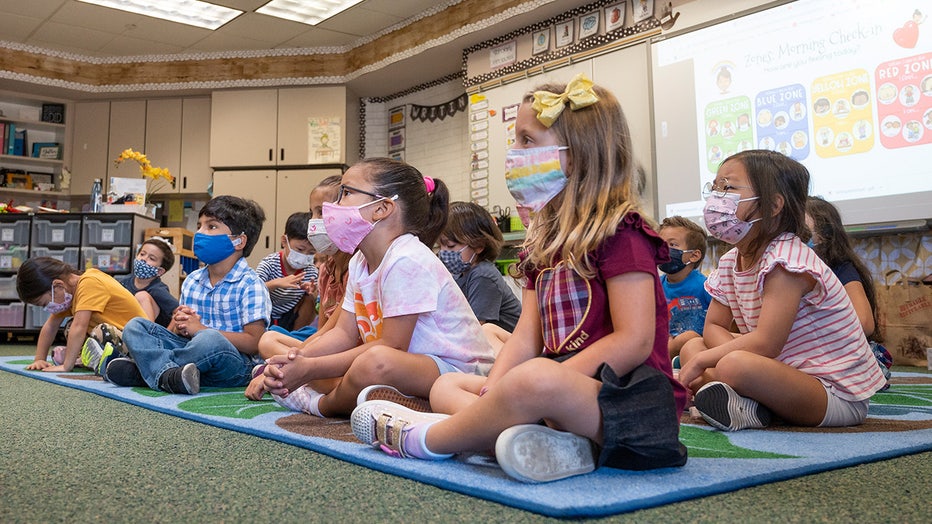Mandatory masking in schools reduced COVID-19 cases during delta surge, study finds
BETHESDA, Maryland - A new study finds schools with mandatory masking during the delta variant surge had far fewer cases of in-school transmission of COVID-19 when compared to schools with optional or partial masking policies.
The study, published in Pediatrics and funded by the National Institutes of Health, compared more than 1.1 million students and over 157,000 staff attending in-person schooling across nine states: North Carolina, Wisconsin, Missouri, California, Washington, Georgia, Tennessee, Kansas and Texas.
Researchers conducted the study when the delta variant was the dominant strain and found that mask requirements resulted in 72-percent fewer cases. Their study did not obtain data on school masking in preventing the spread of the omicron variant.
The study included 61 school districts from kindergarten through grade 12 that provided data from July 26, 2021, through Dec. 13, 2021.

Students listen to their teacher during their first day of transitional kindergarten at Tustin Ranch Elementary School in Tustin, CA on Wednesday, August 11, 2021. (Photo by Paul Bersebach/MediaNews Group/Orange County Register via Getty Images)
According to the study’s authors, six districts had optional masking policies, nine had partial masking policies and 46 had universal masking.
In total, there were 40,601 primary infections acquired in the community (36,032 among students, 4,569 among staff) and 3,085 secondary infections acquired in school (2,844 among students, 241 among staff).
The researchers found that for every 100 community-acquired cases, school districts with mandatory masking had approximately 7.3 cases of in-school infections, while optionally masked districts had 26.4 cases of in-school infections. In other words, school districts with optional masking had approximately 3.6 times the rate of in-school COVID-19 cases when compared to schools with mandatory masking.
"Secondary transmission across the cohort was modest (<10% of total infections) and universal masking was associated with reduced secondary transmission compared to optional masking," the study’s authors wrote.
Throughout the coronavirus pandemic, masking has been a widely used mitigation practice in K-12 school districts to limit in-school transmission.
In September, the U.S. Centers for Disease Control and Prevention released three studies highlighting the importance of using layered prevention strategies including universal masking to stop the spread of the novel coronavirus in schools.
RELATED: COVID-19 cases higher in schools without mask policies, CDC studies show
The studies, published in the site’s "Morbidity and Mortality Weekly Report," found that school districts without a universal masking policy in place were more likely to have COVID-19 outbreaks. Nationwide, counties without masking requirements saw the number of pediatric COVID-19 cases increase nearly twice as quickly during this same period.
One of the studies revealed that Arizona schools in two of the state’s most populous counties were 3.5 times more likely to have COVID-19 outbreaks if they did not have a mask requirement at the start of school compared with schools that required universal masking on day one.
Meanwhile, another study found that during the two weeks following the start of school, the average change in pediatric COVID-19 case rates was lower among counties with school mask requirements (16.32 per 100,000/day) compared with counties without school mask requirements (34.85 cases per 100,000/day).
"These studies continue to demonstrate the importance and effectiveness of CDC’s Guidance for COVID-19 Prevention in K-12 Schools to help districts ensure safer in-person learning and stop the spread of COVID-19," the CDC wrote in a press release. "Promoting vaccination of eligible persons, mask-wearing, and screening testing are all proven methods to continue to work towards the end of the COVID-19 pandemic."
Last July, The American Academy of Pediatrics recommended universal masking in schools, even for those who were vaccinated against the virus that causes COVID-19.
Dr. Anthony Fauci said the guidance was out of an abundance of caution due to the rise in cases blamed on the delta variant of the coronavirus.
Medical experts have said masks are a vital part of the best line of defense against the spread of COVID-19, but facial coverings don’t act as a substitute for other precautionary measures like social distancing, personal hygiene and getting vaccinated.
The CDC recently updated its guidelines for masking and other preventive measures, taking into account community levels of COVID-19. The CDC recommends indoor masking in areas with high community levels of COVID-19. CDC’s COVID-19 Community levels recommendations align with precautions for educational settings.


